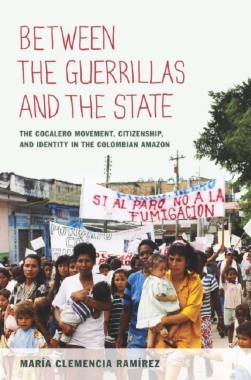Responding to pressure from the United States, the Colombian government in 1996 intensified aerial fumigation of coca plantations in the western Amazon region. This crackdown on illicit drug cultivation sparked an uprising among the region’s cocaleros, small-scale coca producers and harvest workers. More than 200,000 campesinos marched that summer to protest the heightened threat to their livelihoods. Between the Guerrillas and the State is an ethnographic analysis of the cocalero social movement that emerged from the uprising. María Clemencia Ramírez focuses on how the movement unfolded in the department (state) of Putumayo, which has long been subject to the de facto rule of guerrilla and paramilitary armies. The national government portrayed the area as uncivilized and disorderly and refused to see the coca growers as anything but criminals. Ramírez chronicles how the cocaleros demanded that the state recognize campesinos as citizens, provide basic services, and help them to transition from coca growing to legal and sustainable livelihoods.
- Contents
- Acknowledgments
- Acronyms
- Introduction
- 1. History of Colonization, Marginalization, and the State: Guerrillas, Drug Trafficking, and Paramilitarism in the Colombian Amazon
- 2. Coca and the War on Drugs in Putumayo: Illegality, Armed Conflict, and the Politics of Time and Space
- 3. Turning Civic Movements into a Social Movement: Antecedents of the Cocalero Social Movement
- 4. The Cocalero Social Movement: Stigmatization and the Politics of Recognition and Identity
- 5. Negotiations with the Central Government: Clashing Visions over the “Right to Have Rights”
- 6. Competing States or Competing Governments? An Analysis of Local State Formation in a Conflict-Ridden Zone
- 7. From Social to Political Leadership: Gaining Visibility as Civil Society in the Midst of Increased Armed Conflict
- 8. Plan Colombia and the Depoliticization of Citizenship in Putumayo
- Epilogue
- Appendixes
- Notes
- References
- Index

